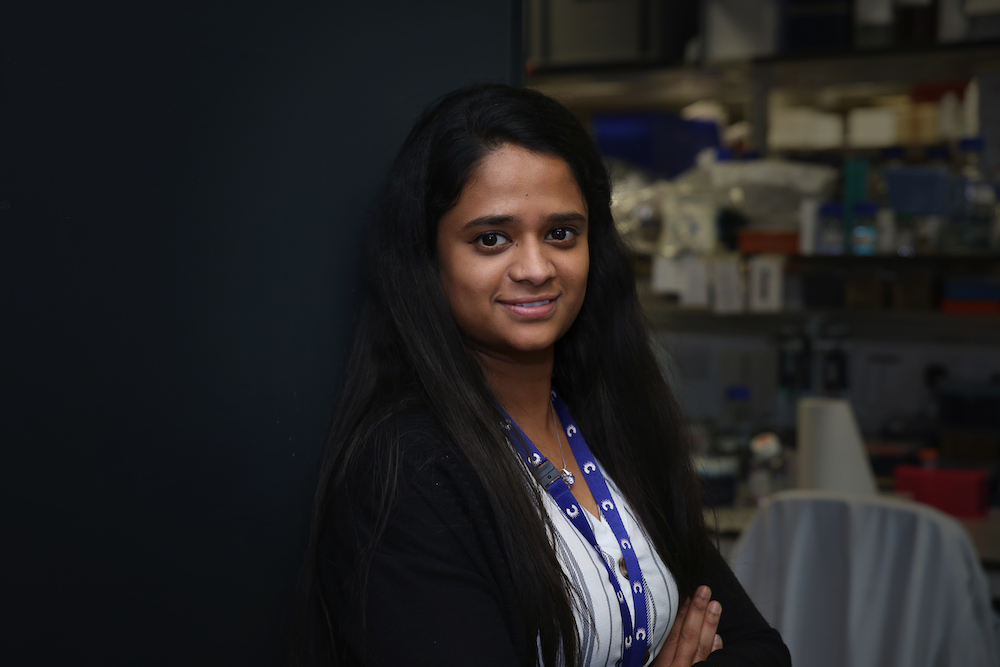Closing date: 09/03/2026
MB-PhD Studentship: Investigation of tumour microenvironment in influencing growth in lobular breast cancers
Lead Supervisors: Dr Sankari Nagarajan
Co-Supervisors: Dr Sumitra Mohan, Prof. Robert Clarke, Dr Andrew Gilmore, Dr Ciara O’ Brien
Applications Deadline: Monday 9th March 2026
Interviews: Week commencing 27th April 2026
Start date: September 2026
Project Keywords: Lobular breast cancer, fibroblasts, epigenetics
Research Opportunity: MB-PhD Studentship
Project Outline
Lobular breast cancers represent one of the understudied cancers but of unmet need, due to their poor response to targeted therapies. Failure in drug response is often associated with differential molecular changes in cancer cells according to the origin of the tumour (ductal or lobular), either associated with DNA sequences (genetic) or other than DNA that affect gene expression (so-called epigenetic alterations). Understanding the coupled genetic and transcriptional reprogramming is critical in revealing the key regulators of treatment response. However, this interactive reprogramming is poorly understood in any cancer, let alone lobular cancers. Moreover, our current knowledge on these cancers includes evidence accumulated from in vitro-based studies which don’t properly replicate the patient samples.
This project aims to understand the previously unknown lobular-specific transcriptional reprogramming influenced by the stromal landscape, by studying gene alterations and gene expression using 3D models, in vivo xenografts and primary tumour tissues. Our study will explore the following:
- Identify the influence of stromal factors on lobular cancer growth
- Categorise the primary lobular cancer samples with ARID1A expression (loss or presence)
- Investigate the mutation-specific stromal and immune landscape and its role in gene and protein expression reprogramming
Importantly, our comparative analysis with lobular and ductal samples will allow us to identify mechanisms of differential growth response and transcriptional reprogramming, which can indicate potential effective therapeutic approaches.
The proposed study will utilise a multidisciplinary supervisory team with lot of training opportunities for students in 3D culturing, in vivo assays, spatial imaging and spatial transcriptomics profiling. We successfully obtained access to lobular and ductal tumour samples with matched FFPE and frozen material from Breast Cancer Now Tissue biobank for this study. This will be an unbiased one-of-a-kind study investigating the interactive transcriptional reprogramming in controlling growth response.
Applications for this project are now open. Please complete your application on The University of Manchester Postgraduate Application Portal.
About Dr Sankari Nagarajan (project Lead Supervisor)
I am a breast cancer research scientist investigating the transcriptional regulation of disease progression in breast cancers. I completed my Integrated M.Sc. in Bio-Medical Science at Bharathidasan University, Trichy, India. After obtaining a prestigious and competitive PhD scholarship from German Academic Exchange Service (DAAD), I moved to the University of Goettingen, Germany, to work with Prof. Dr. Steven A Johnsen, for my PhD.
I am currently the deputy director of Manchester Breast Centre, scientific committee member of Lobular Breast Cancer UK charity and the co-lead of Divisional Research Community and culture team. I strongly support patient engagement activities and mentors early career students/postdocs to support women in academia and science with childcare responsibilities.

Key information
Find answers to some common questions about our MB-PhD Studentships.
To apply to intercalate onto the PhD in Cancer Sciences component of the MB-PhD, you must meet the below criteria and satisfy the general requirements for permission to intercalate set by your institution, including passing all components of the MBChB at first attempt in the year prior to intercalation.
A University of Manchester MBChB student
- holding a BSc (hons) 2.1 or above in a relevant subject and in year 2 or year 3 of the MBChB or year 1 or year 2 of GEM; or
- currently studying in year 3 of the MBChB or year 2 of GEM
A University of St Andrews Medicine BSc (Hons) student on the Manchester course pathway:
- holding or predicted a BSc (hons) 2.1 or above and be intending to intercalate straight onto the MB-PhD ahead of your arrival in Manchester or by no later than between year 3 and year 4 of the Manchester MBChB programme
A University of Leeds MBChB student:
- currently studying in year 3 of the MB ChB
International applicants (including EU nationals) must ensure they meet the relevant academic eligibility criteria (including English Language).
The PhD component of the MB-PhD studentship is usually funded for three years, or four years in exceptional circumstances with prior agreement of MB-PhD Committee and supervisory team.
The studentship covers:
- An annual stipend of £22,113 per year to help with living costs
- Full funding for your PhD tuition fees (at the UK rate, with fee bursaries available for high-performing EU/International candidates)
- PhD project consumables and running costs, including costs for researcher development such as conferences and travel
- MBChB tuition fees (at the UK rate) up to a maximum of £45,000 per student inclusive of interest.
Please speak to the MCRC Training Office regarding individual calculations as these could vary from the stated amount, dependent on how and what fees have been paid. These are conditional upon completion of MBChB and PhD components.
Here are our quick steps to apply for our MB-PhD programme:
1. Eligibility
First, you need to check you are eligible to apply for an MB-PhD. Please see the eligibility tab (below) to read all criteria.
2. Contact supervisors
We encourage you to contact the supervisor of any MB-PhD projects that you are interested in before starting your application. Having these conversations will help you to get a feel for the different research themes and projects on offer.
3. Register
Register to apply for our MB-PhD opportunities using the Postgraduate Application Portal. You must create an account to register.
4. Create a new application
When you create a new application make sure you select the following:
- Academic Career – Postgraduate Research
- Mode of Attendance – Full-time
- Program Description – search for MB-PhD and then select the MB-PhD Programme
- Under ‘Research Title’ list MB-PhD Programme. You can provide supervisor preferences/research interests in your accompanying supporting statement and these will be considered at and after interview. You can apply for a maximum of two projects.
- If you are shortlisted, you’ll be interviewed by our MB-PhD Committee and subject to your interest performance and your project/research preferences will be matched with a lead supervisor.
- For the funding resources section, please include the following information:
– Select ‘Yes’ from the drop-down
– Type of Funding: University of Manchester Scholarship
– Awarding Body: Cancer Research UK MB-PhD
– Status of Funding – Awarded
– Funding Covers – Fully Funded
– Leave the remaining boxes blank
5. Supporting documents
Your application form must be accompanied by a CV and supporting statement. You will also provide referee details (see 6. References). You do not need to add a research proposal, and can ignore this section of the application form, since your lead supervisor will have already produced this to advertise their project.
CV
This should include:
- qualifications (GCSE, A-level or equivalent, and any higher education qualifications, including grades, and your current programme)
- academic prizes, research projects, and academics interests
- extracurricular interests, and activities and positions of responsibility relevant to your application
The information you provide in your CV will be considered in relation to widening participation, and/or university access policies, to ensure that all applicants are treated fairly.
Supporting statement
This should be 1,000 words maximum and include your reason for applying to the MB-PhD programme and your interest and suitability for the project/s you are applying to (maximum two projects). You can include project/research interest/s here and these will be considered at and post-interview.
Supporting documents can be uploaded and submitted with the online application form.
If you have any issues, your supporting documents can be sent directly to the Doctoral Academy Admissions Team at admissions.doctoralacademy@manchester.ac.uk, CC’ing in mcrctraining@manchester.ac.uk.
6. References
You need to list two referees, one of which must be an academic referee from the University of Manchester, University of St Andrews Manchester-pathway or University of Leeds MBChB programme.
This could be a:
- Clinical debrief tutor
- PEP tutor
- Literature research project supervisor
- PPD tutor
Your referees will be automatically contacted by UoM Doctoral Academy when you provide their details upon application. We would recommend notifying them of application timelines in advance.
References cannot be submitted by a supervisor named on the project you are applying for.
7. Acknowledgement and review process
Once you have submitted your application form, we will email you with an acknowledgement.
We will review your application after the application deadline and once we’ve received all your supporting documents. If you are shortlised, you will be invited to attend an interview. If successful at interview, we will also share your application with a nominated supervisor(s) to review.
8. Interviews
We will email you if you are invited to interview.
Interviews will take place at the Oglesby Cancer Research Building in Withington in Spring 2026.
Applying to intercalate
UoM MBChB students must complete an intercalation Expression of Interest form by 12th January 2026 (we may be able to consider late applications to intercalate in exceptional circumstances). UoM students should contact intercalation@manchester.ac.uk for guidance.
UoL MBChB must apply to intercalate via UoL processes by January 2026.
University of St Andrews Manchester pathway students can contact mcrctraining@manchester.ac.uk for guidance.
Key dates
- Applications open: Monday 20th October 2025
- Applications deadline: Monday 9th March 2026
- Interviews: Week commencing 27th April 2026
- Start date: September 2026
Useful Links
Submit your application
Interested in applying for this opportunity? Submit your application on The University of Manchester application portal.
MB-PhD Studentships
Find out more about our MB-PhD Studentships which allow you to study a fully-funded PhD alongside your medical degree.
Get in Touch
Contact Yasmin Noori, Postgraduate Programme Manager.
A Day in the Life of an MCRC MB-PhD Student
Watch our short video to see what it's like to be an MB-PhD student in Manchester.
Researcher Stories
Read first-hand experiences of from cancer scientists from across Manchester.
Why Manchester?
Find out why postgraduate students choose to study in Manchester.






